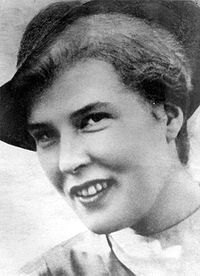
Eva-Maria Buch
Encyclopedia

Nazi Germany
Nazi Germany , also known as the Third Reich , but officially called German Reich from 1933 to 1943 and Greater German Reich from 26 June 1943 onward, is the name commonly used to refer to the state of Germany from 1933 to 1945, when it was a totalitarian dictatorship ruled by...
associated with the Red Orchestra (Rote Kapelle) resistance group.
Life
Buch was born and lived with her parents in CharlottenburgCharlottenburg
Charlottenburg is a locality of Berlin within the borough of Charlottenburg-Wilmersdorf, named after Queen consort Sophia Charlotte...
, a borough of Berlin
Berlin
Berlin is the capital city of Germany and is one of the 16 states of Germany. With a population of 3.45 million people, Berlin is Germany's largest city. It is the second most populous city proper and the seventh most populous urban area in the European Union...
, until the mid-1930s. She was sent to the Ursuline
Ursulines
The Ursulines are a Roman Catholic religious order for women founded at Brescia, Italy, by Saint Angela de Merici in November 1535, primarily for the education of girls and the care of the sick and needy. Their patron saint is Saint Ursula.-History:St Angela de Merici spent 17 years leading a...
School run by Catholic
Catholic
The word catholic comes from the Greek phrase , meaning "on the whole," "according to the whole" or "in general", and is a combination of the Greek words meaning "about" and meaning "whole"...
nun
Nun
A nun is a woman who has taken vows committing her to live a spiritual life. She may be an ascetic who voluntarily chooses to leave mainstream society and live her life in prayer and contemplation in a monastery or convent...
s until it was shut down in 1939. Without an Abitur
Abitur
Abitur is a designation used in Germany, Finland and Estonia for final exams that pupils take at the end of their secondary education, usually after 12 or 13 years of schooling, see also for Germany Abitur after twelve years.The Zeugnis der Allgemeinen Hochschulreife, often referred to as...
, she attended a seminar for interpreters
Interpreting
Language interpretation is the facilitating of oral or sign-language communication, either simultaneously or consecutively, between users of different languages...
at the University of Berlin
Humboldt University of Berlin
The Humboldt University of Berlin is Berlin's oldest university, founded in 1810 as the University of Berlin by the liberal Prussian educational reformer and linguist Wilhelm von Humboldt, whose university model has strongly influenced other European and Western universities...
.
While working at a bookshop during 1941 and 1942, Buch became acquainted with Wilhelm Guddorf
Wilhelm Guddorf
Wilhelm Guddorf was a journalist and resistance fighter against the Third Reich. He was reputedly a member of the Red Orchestra resistance group.- Life :...
, through whom she became involved with the Red Orchestra. In autumn 1942, Guddorf attempted to hide Buch from a wave of Red Orchestra arrests, but she was found and arrested by the Gestapo
Gestapo
The Gestapo was the official secret police of Nazi Germany. Beginning on 20 April 1934, it was under the administration of the SS leader Heinrich Himmler in his position as Chief of German Police...
on October 11. Guddorf was arrested and sentenced to death soon thereafter. He was executed the following year, on May 13.
Buch was charged and her case heard at the Reichskriegsgericht (Reich Military Tribunal
Military tribunal
A military tribunal is a kind of military court designed to try members of enemy forces during wartime, operating outside the scope of conventional criminal and civil proceedings. The judges are military officers and fulfill the role of jurors...
) between February 1-3, 1943. The primary evidence given against her was an article meant for slave labourers working in munition factories that she had translated into French. To protect others, Buch claimed she had composed the article herself. As a consequence, she was found guilty and sentenced to death. Her parents appealed to Adolf Hitler
Adolf Hitler
Adolf Hitler was an Austrian-born German politician and the leader of the National Socialist German Workers Party , commonly referred to as the Nazi Party). He was Chancellor of Germany from 1933 to 1945, and head of state from 1934 to 1945...
for clemency, but he personally refused their request. Buch was hanged at Plötzensee Prison
Plötzensee Prison
Plötzensee Prison was a Prussian institution built in Berlin between 1869 and 1879 near the lake Plötzensee, but in the neighbouring borough of Charlottenburg, on Hüttigpfad off Saatwinkler Damm. During Adolf Hitler's time in power from 1933 to 1945, more than 2,500 people were executed at...
, Berlin, on August 5, 1943. She was twenty-two.
Memorials
Eva-Maria Buch is remembered in Berlin by a memorial stone at Unter den LindenUnter den Linden
Unter den Linden is a boulevard in the Mitte district of Berlin, the capital of Germany. It is named for its linden trees that line the grassed pedestrian mall between two carriageways....
6 and a plaque near St. Hedwig's Cathedral
St. Hedwig's Cathedral
St. Hedwig's Cathedral is a Roman Catholic cathedral on the Bebelplatz in Berlin, Germany. It is the seat of the archbishop of Berlin.It was built in the 18th century as the first Catholic church in Prussia after the Protestant Reformation by permission of King Frederick II...
. Since 1993, the Tempelhof
Tempelhof
Tempelhof is a locality of Berlin within the borough of Tempelhof-Schöneberg. It is the location of the former Tempelhof Airport, one of the earliest commercial airports in the world. It is now deserted and shows as a blank spot on maps of Berlin. Attempts are being made to save the still-existing...
City Library has borne the name Eva-Maria-Buch-Bibliothek.
Sources
- http://de.wikipedia.org/wiki/Eva-Maria_Buch
- Plötzensee Prison

